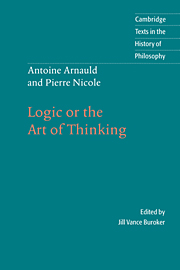Book contents
- Frontmatter
- Contents
- Acknowledgments
- Introduction
- Chronology
- Further reading
- List of works cited in the text and notes
- Note on the text and translation
- Logic or the Art of Thinking
- Preface
- Foreword
- First discourse
- Second discourse
- First part, containing reflections on ideas
- Second part of the Logic, containing reflections people have made about their judgments
- Third part of the Logic, on reasoning
- Fourth part of the Logic, on method
- Index
- Cambridge texts in the history of philosophy
Second part of the Logic, containing reflections people have made about their judgments
Published online by Cambridge University Press: 05 June 2012
- Frontmatter
- Contents
- Acknowledgments
- Introduction
- Chronology
- Further reading
- List of works cited in the text and notes
- Note on the text and translation
- Logic or the Art of Thinking
- Preface
- Foreword
- First discourse
- Second discourse
- First part, containing reflections on ideas
- Second part of the Logic, containing reflections people have made about their judgments
- Third part of the Logic, on reasoning
- Fourth part of the Logic, on method
- Index
- Cambridge texts in the history of philosophy
Summary
CHAPTER 1
Words as related to propositions
Since our purpose here is to explain various remarks that have been made about judgments, and since judgments are propositions composed of different parts, we should begin by explaining these parts, which are primarily nouns, pronouns, and verbs.
It is not particularly important to examine whether it is up to grammar or logic to deal with the parts of judgment. It is more concise to say that everything serving the purpose of each art belongs to that art, whether that knowledge is particular to it or is useful to other arts and sciences.
Now certainly it is useful to the aim of logic, which is to think well, to understand the different functions of sounds intended to signify ideas. The mind is accustomed to linking them so closely that we can scarcely conceive one without the other, so that the idea of the thing prompts the idea of the sound, and the idea of the sound that of the thing.
On this topic we can generally say that words are [104] distinct and articulated sounds that people have made into signs to indicate what takes place in the mind. Since what takes place in the mind consists in conceiving, judging, reasoning, and ordering, as we have already said, words function to indicate all these operations.
- Type
- Chapter
- Information
- Publisher: Cambridge University PressPrint publication year: 1996



